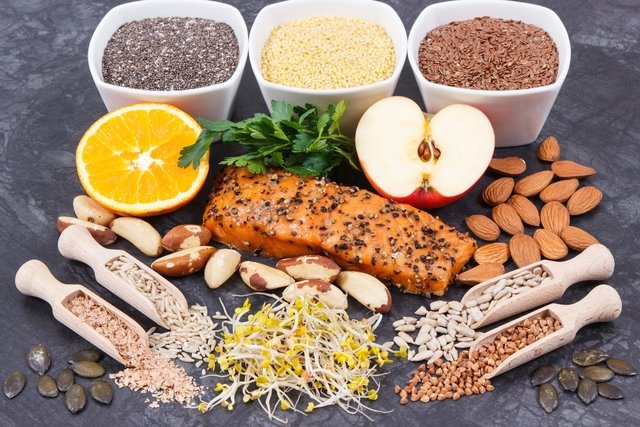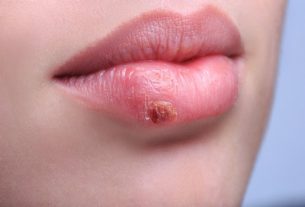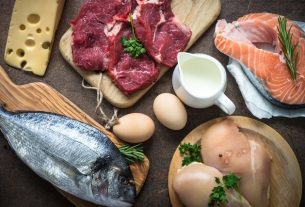Foods such as seaweed, Brazil nuts, oranges and eggs are great options to include in the diet for hypothyroidism, as they provide nutrients, such as iodine, fiber, antioxidants and healthy fats, which are necessary for the proper functioning of the thyroid.
Foods such as broccoli, turnips and cabbage should be consumed in moderation, as they contain glucosinolates, which are compounds that can reduce the production of hormones in the thyroid, impairing the functioning of the gland.
In addition to diet, people with hypothyroidism also need to be monitored by an endocrinologist, who may recommend medications to regulate thyroid functions and reduce symptoms of the disease, which can include tiredness, weight gain and dry skin. Learn about other symptoms and see how to treat hypothyroidism.

Foods that should be prioritized
In the diet for hypothyroidism, it is essential to maintain a balanced and healthy diet, prioritizing foods that are sources of fiber, antioxidants and minerals, such as iodine, selenium, zinc and copper, including:
- Iodine source foods, such as seaweed, iodized salt, seafood, milk and dairy products. See a list of other foods that are sources of iodine;
- Zinc-rich foods, such as beef, walnuts, chestnuts and Brazil nuts. Find out how to increase your zinc intake in your diet;
- Food sources of seleniumsuch as eggs, meat, seafood, mushrooms, whole grains and Brazil nuts;
- Copper-rich foodssuch as cocoa, peanuts, almonds and oats;
- Foods rich in vitamin Asuch as beef liver, eggs, dairy products, pumpkin, carrots, zucchini, apricots, peaches and papaya;
- Food sources of amino acidssuch as meat, fish, vegetables, nuts and seeds;
- Foods high in antioxidants, such as acerola, pumpkin, cashew, papaya, strawberry, tomato, avocado and orange. Discover other foods rich in antioxidants;
- Infusions with natural herbs that help alleviate the symptoms of hypothyroidism, such as gentian tea.
It is also important to include whole grains in your diet, such as wholemeal bread, wholemeal pasta and brown rice, as these foods contain good amounts of fiber, which is important for promoting satiety and preventing weight gain.
Foods that should be avoided
Some foods that can cause weight gain or harm the production of thyroid hormones and should be avoided are:
- Foods rich in sugar, such as cakes, sweets, soft drinks, ice cream, cookies;
- Refined cerealssuch as white bread, white pasta, white rice;
- Food sources of glucosinolatessuch as broccoli, cabbage, turnips, radishes, cauliflower and Brussels sprouts;
- Processed foodssuch as smoked meats, margarine, ready-made sauces and seasonings, fast food meals and packaged snacks;
- Soy and derivativessuch as soy milk, tofu, tempeh and soy oil.
It is important to highlight that these foods do not need to be completely excluded from the diet, it is only important to avoid excessive and frequent intake of these foods. Learn how to consume these foods to prevent thyroid damage.
Diet menu for hypothyroidism
The following table provides an example of a 3-day menu for hypothyroidism:
This menu is just an example of what you can eat during the hypothyroidism diet, which can vary according to each person’s current weight and health status. Therefore, it is advisable to have a consultation with a nutritionist for a complete assessment and an individualized meal plan.
Other recommendations
It is important to follow other recommendations, in addition to diet, to control the symptoms of hypothyroidism, such as:
- Eat 3 main meals and 2 to 3 snacks a day;
- Consume 2 to 2.5 liters of water;
- Perform physical activity regularly, at least 3 times a week for 1 hour;
- Increase fruit and vegetable consumption to around 5 servings per day;
- Prepare food in the oven or grill, avoiding fried foods;
- Avoid consuming simple sugars and foods rich in fat.
See nutritionist Tatiana Zanin for other eating tips to maintain thyroid health:
Do people with hypothyroidism gain weight more easily?
Hypothyroidism can slow down metabolism, which can cause weight gain in some people who have this disease. However, weight gain usually only occurs between 2 and 4 kg, and is not the main cause of overweight or obesity. Check out how and why thyroid problems can make you gain weight.
Therefore, to avoid weight gain, it is essential to maintain a balanced and healthy diet, and exercise regularly, as these factors influence weight gain more than hypothyroidism itself.
Bibliography
- NUTRITOTAL. 4 foods that harm the thyroid. 2019. Available at: <https://nutritotal.com.br/publico-geral/material/4-alimentos-que-prejudicam-a-tireoide/>. Accessed on 01 Jul 2021
- MEZZOMO, R, Thais; NADAL, Juliana . Effect of nutrients and food substances on thyroid function and hypothyroidism. Demetra: Food, Nutrition and Health. Vol.11. 2.ed; 427-443, 2016
- TRIGIANNI, Vincenzo; GUASTAMACCHIA, Edoardo. Role of iodine, selenium and other micronutrients in thyroid function and disorders.. Endocr. Metab. Immune Disord. Drug Targets. 277 – 294, 2009
- BRAZILIAN SOCIETY OF ENDOCRINOLOGY AND METABOLOGY. Food and thyroid. 2021. Available at: <https://www.endocrino.org.br/alimentacao-e-tireoide/>. Accessed on November 11, 2021
- SILVA, S, Liliana Isabel. Nutritional Approach to Thyroid Function. Course completion thesis, 2018. University of Porto.
- BRAZILIAN SOCIETY OF ENDOCRINOLOGY AND METABOLOGY. Understanding the thyroid: hypothyroidism. Available at: <https://www.endocrino.org.br/entendê-a-tireoide-hipotireoidismo/>. Accessed on November 11, 2021
- MEZZOMO, Thais; NADAL, Juliana. Effect of nutrients and dietary substances on thyroid function and hypothyroidism. Demetra: food, nutrition & health. 427-443, 2016

Sign up for our newsletter and stay up to date with exclusive news
that can transform your routine!
Warning: Undefined array key "title" in /home/storelat/public_html/wp-content/plugins/link-whisper-premium/templates/frontend/related-posts.php on line 12
Warning: Undefined array key "title_tag" in /home/storelat/public_html/wp-content/plugins/link-whisper-premium/templates/frontend/related-posts.php on line 13




